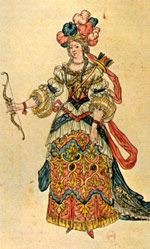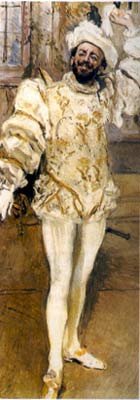|
From the very beginning opera brought together all the arts. It involved painting, poetry, drama, dance and music, making it the most complex of art forms. It was, as Samuel Johnson later pointed out, exotic and irrational, and, as many have found, remarkably expensive. It remained, nevertheless, of continuing social and political importance. In the first respect it edified and entertained, and in the second it served as an expression of the power and splendour of the monarch in an age of kings.
Early Opera
There was always argument about who composed the first opera. Some of his contemporaries regarded the Roman composer Cavalieri's La rappresentatione di Anima e di Corpo (1600) (The Representation of Soul and Body) as the first true example. Written for the Oratorian movement of St Philip Neri and with a dramatic content recalling that of medieval morality plays, in its combination of drama with the new music, it had some claim to priority. Allegorical figures dispute in a work that seeks to show the superiority of the spiritual. The composer himself claimed to have been the first to unite music and drama in this way, although rivals claimed to have done the same things some years before.
 While Cavalieri's work entertained and edified the entire College of Cardinals in Rome, other early operas were designed as court entertainments of a more secular kind. Works of this kind were staged, notably, for the Medici rulers in Florence and, most memorably of all, at Mantua. It was there that Monteverdi had his Orfeo staged in 1607, followed the next year by Arianna , now lost. The subject of Orfeo (Orpheus) had already been treated in Florence by the composers Peri and by Caccini. The story had an obvious relevance. The legendary musician Orpheus, grieving at the loss of his beloved Eurydice, attempts to save her from the Underworld by the power of his music and is almost successful, thwarted only at the last minute by his own doubts. Orpheus not only demonstrates the importance of music. He is also represented as a shepherd among shepherds, making it possible for the poet and composer to draw on an existing literary and musical tradition. Pastoral poems and romances were set in a conventional Arcadia, where the only troubles that arose came from the thwarted love of amorous shepherds, whose heart- ache often proved fatal. The Italian madrigal, the part- songs of the 16 th century, often set pastoral verses, drawing on another tradition of the ancient world. Here the life of the shepherd was idealised in an urban or court view of the country, a convention that could present the ageing Queen Elizabeth of England as Oriana, Queen of the Shepherds, shortly before her death. Monteverdi and his librettist were drawing on existing literary and musical conventions.
While Cavalieri's work entertained and edified the entire College of Cardinals in Rome, other early operas were designed as court entertainments of a more secular kind. Works of this kind were staged, notably, for the Medici rulers in Florence and, most memorably of all, at Mantua. It was there that Monteverdi had his Orfeo staged in 1607, followed the next year by Arianna , now lost. The subject of Orfeo (Orpheus) had already been treated in Florence by the composers Peri and by Caccini. The story had an obvious relevance. The legendary musician Orpheus, grieving at the loss of his beloved Eurydice, attempts to save her from the Underworld by the power of his music and is almost successful, thwarted only at the last minute by his own doubts. Orpheus not only demonstrates the importance of music. He is also represented as a shepherd among shepherds, making it possible for the poet and composer to draw on an existing literary and musical tradition. Pastoral poems and romances were set in a conventional Arcadia, where the only troubles that arose came from the thwarted love of amorous shepherds, whose heart- ache often proved fatal. The Italian madrigal, the part- songs of the 16 th century, often set pastoral verses, drawing on another tradition of the ancient world. Here the life of the shepherd was idealised in an urban or court view of the country, a convention that could present the ageing Queen Elizabeth of England as Oriana, Queen of the Shepherds, shortly before her death. Monteverdi and his librettist were drawing on existing literary and musical conventions.

|










 View opera ELISIR D'AMORE
View opera ELISIR D'AMORE
